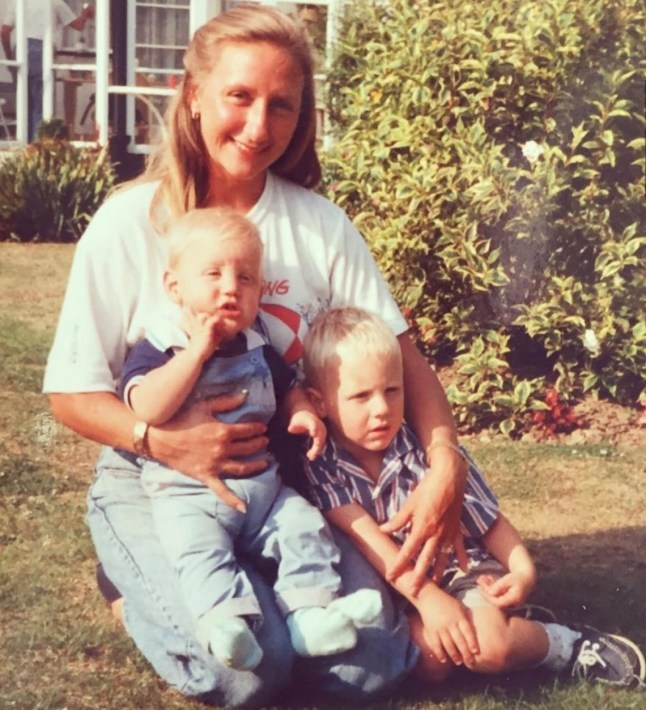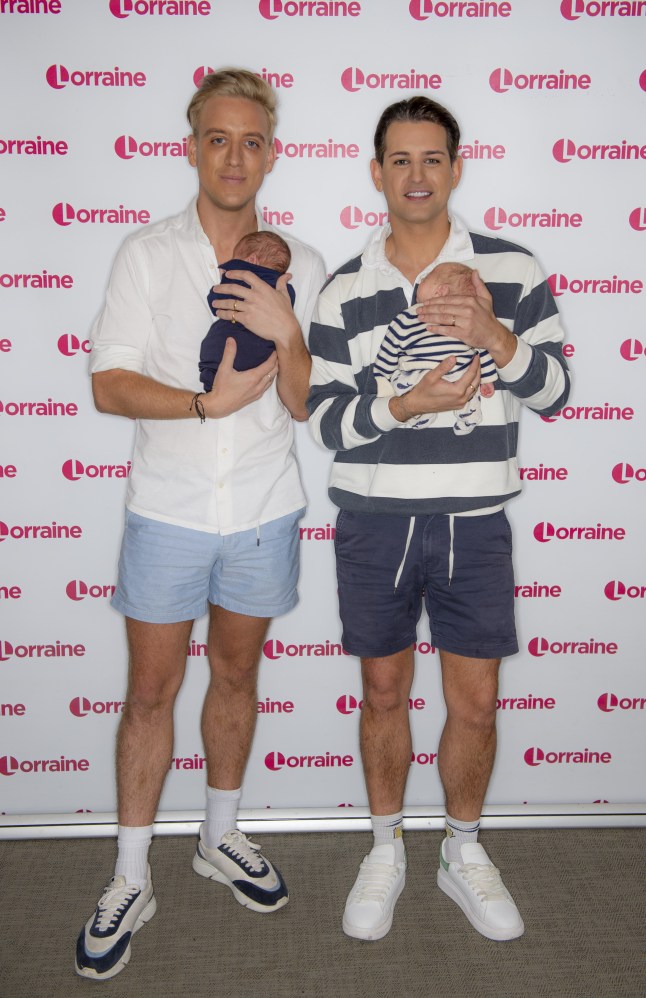
When our twins [Gareth shares a son and daughter with husband Ollie Locke] were born in July, the first person I wanted to ring was my mum. She’s had Alzheimer’s for 15 years and it’s been seven years since I was able to have a conversation with her. But there are still times when I reach to dial her number. And every time it kills me.
Mum was just 54 when she was diagnosed with early-onset Alzheimer’s. She was a real powerhouse. She launched and ran her own recruitment agency – becoming a role model to countless other women.
She had started struggling with new technology – something she would normally have taken in her stride. She was so young that, at first, doctors assumed the symptoms were caused by the menopause. But my dad and her business partner – whose mother-in-law had Alzheimer’s – persuaded her to seek more tests.
I came home from school one summer’s evening to find Mum and Dad in the kitchen, weeping in each other’s arms. We are a very open family with no secrets. My parents told me and my older brother, Drew, the truth straight away. I knew it was life-changing but I had no conception of what it really meant.
I’m not sure any of us really did. We were much more ignorant about Alzheimer’s back then and there was still a huge stigma. I was only 18. And for years I was in denial. So was Mum.
In the first five years, her decline was gradual and then she went downhill very rapidly. Now she is asleep most of the time. Often Dad said he wished he could take it on himself. That’s how much he loves Mum. They celebrated their 44th wedding anniversary last week and their bond is extraordinary.

At first, I didn’t realise how much it would affect our entire family. In fact, it’s robbed us all of so much. Mum adores travelling and had so many plans about what she was going to do when she retired. Dad – who’s the same age as Mum – had stepped away from running his restaurants in 1994.
I was always closest to Mum because we are very alike. I thought I’d have my mum for another 30 years or so. I’d looked forward to growing up and being two adults together. That’s never going to happen.
None of my friends really understood because Mum was so young to have the condition. She and Dad are still only 67. I felt really isolated until I reached out to the Alzheimer’s Society.That was about eight years ago, when I realised that I needed to understand the condition more so that I could help Mum better.
I wish I had found them sooner. They look after the entire family – offering everything from practical tips to talking sessions.
One of the most wonderful days I have had recently was on a Memory Walk, where I joined hundreds of other families who have a loved one with Alzheimer’s. There’s such a bond of love and understanding.
Dad managed to look after Mum himself until three years ago. Now she’s in a wonderful home near him in Suffolk. He visits every single day, gives her lunch and chats to her. He’s reluctant to even come and stay with Ollie and me overnight because that would mean missing a visit.
But I know he’s lonely. Sometimes he says he can’t really remember what it was like when Mum was well.
I try to visit Mum every week. I chat about what I’ve been up to and play her music. Mum can’t speak but she can mumble and she is responsive. She always loved music and there will be a flicker of recognition when I put on a favourite Abba track.
Mum always wanted to be a grandma. I showed her pictures before the babies arrived – they were conceived by IVF – and kept telling her that she was going to be a granny.And I’m beyond excited about taking them to meet her.
I hope it’s getting through. When my niece was born three years ago, my brother took her to see Mum. By then she was catatonic but she got very animated and distinctly said ‘granny.’ It was extraordinary.
Mum’s name is Maggie. So we’ve named our little boy Apollo Magnus Obi after her. Our daughter is Cosima Emily Bex.
Seeing Mum’s suffering has made me super-conscious of my own health. I don’t want my kids to go through this. I recently took a test which shows that I have a 50% chance of developing Alzheimer’s after the age of 75.
More Trending
I’ve overhauled my life – given up smoking, barely drink, and exercise regularly. I’ve even got a brain-training app on my phone.
I’ve come to terms with what has happened but that doesn’t mean the pain isn’t there. Thinking of Mum and knowing all that she is missing can still make me cry.
As told to Tessa Cunningham.
Get the rest you deserve
Gareth is an ambassador for the Alzheimer’s Society.
Alzheimer's and dementia: the facts
The most common forms of dementia (symptoms of a decline in brain function) are Alzheimer’s disease followed by vascular dementia.
Alzheimer’s is caused when plaques and tangles form in the brain making it increasingly hard for it to function properly. Early symptoms include forgetting recent events, struggling to remember words, becoming disorientated in familiar places and finding it difficult to concentrate.
Common early symptoms of vascular dementia include problems making decisions or following a series of steps, such as cooking a meal; slower speed of thought and trouble sleeping. The condition can also cause significant mood changes and depression and make people behave completely out of character.
Dementia is the UK’s biggest killer – and one in three babies born today will develop dementia in their lifetime. The risk of developing both Alzheimer’s and vascular dementia roughly doubles every five years from the age of 65. Women and men are affected equally. Diabetes, obesity, heart problems and high blood pressure all increase the risk.
However, you can significantly reduce your chances of developing the diseases by leading a healthy lifestyle – not smoking or drinking to excess, eating a balanced diet and getting regular exercise. Keeping mentally and socially active is also beneficial.
The third most common form of dementia – accounting for an estimated 20 per cent of cases – is Lewy body. With this condition, tiny clumps of protein appear in the brain’s nerve cells, causing a range of issues including mood swings, problems processing thoughts, hallucinations, difficulty balancing and walking slowly. Although DLB (dementia with Lewy body) can affect people under 65, it is much more common as we age, affecting men and women equally.
There is currently no cure for any of the forms of dementia. But getting an early diagnosis is very important in allowing you and your loved ones to access all the medical and social support available. If you are worried that you have any of the symptoms, your GP will be able to refer you to a specialist who can carry out a range of tests.
If you are worried that yours or someone else’s symptoms may be dementia, download the Alzheimer’s Society symptoms checklist, on alzheimers.org.uk; for more information or support on anything you’ve read here, call our support line on 0333 150 3456 or visit our website.














